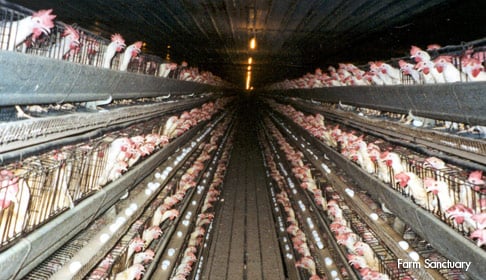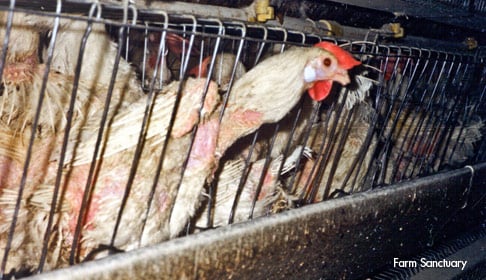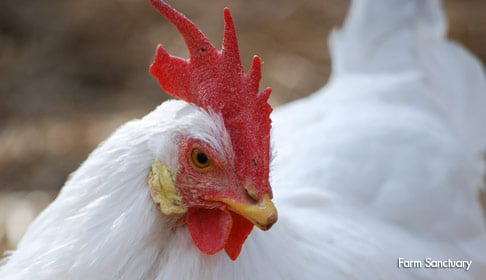By Bruce
Battery cages are the small wire cages where about 95 percent of laying hens spend their entire lives; each hen is given about 67 to 76 square inches of space (a standard sheet of paper measures 94 square inches). To get a sense of a hen’s life in a battery cage, imagine spending your entire life in a wire cage the size of your bathtub with four other people. You wouldn’t be able to move, so your muscles and bones would deteriorate. Your feet would become lacerated. You would go insane. That’s precisely what happens to laying hens.
In the United States, roughly nine billion chickens, pigs, and other farm animals are consumed annually, and the vast majority of them are abused in ways that would warrant felony cruelty-to-animals charges were dogs or cats the victims. But three systems are particularly cruel: gestation crates for pregnant pigs, veal crates for calves, and battery cages for laying hens. As of January 1, all three are illegal across Europe, and it is past time for the United States and Canada to follow suit.
After decades of consumer outcry, the veal industry recently took the important step of announcing that it will work toward eliminating the crate confinement of calves. And, as discussed previously, gestation crates may also be headed for the dust bin of history. While this is positive news for pigs and calves, there is currently no clear end in sight for battery cages, with roughly 95 percent of all eggs in the United States still coming from caged hens. There are roughly 4.5 million mother pigs and fewer than 500,000 calves in crates, and approximately 250 million hens in battery cages. So for every caged calf or pig, there are roughly 50 caged hens.
Barren battery cages are so hideously cruel that, in addition to having been outlawed across the European Union, they have been condemned by the Pew Commission on Industrial Farm Animal Production, which included former Kansas governor John Carlin and former Secretary of Agriculture Dan Glickman (who also chaired the House Agriculture committee), as well as farmers and ranchers. They’re also condemned by every animal protection group in the world.
Here’s why:
Battery Cages Destroy Chickens’ Bodies
Battery cages are so small that not one hen can extend her wings, yet there are three or more hens in each cage. The animals’ muscles and bones waste away from lack of use. By the time hens are removed from cages after about two years, they’ve suffered from severe bone loss and tens of millions suffer new broken bones as they’re ripped from their cages.
Some birds’ skeletal systems become so weak that their spinal cords deteriorate and they become paralyzed; the animals then die from dehydration in their cages. This unimaginably horrid situation is so common that the industry has a term for it, “cage fatigue,” and investigation after investigation finds living birds forced to stand on the rotting, mummified carcasses of their dead cage-mates. Additionally, standing and rubbing against wire cages destroys the health of hens’ feathers and skin, and the birds’ overgrown claws often become caught in cage wires; they either die where they are trapped, or they have to tear their skin to escape. Click here or here for documentation and video; it is hard to imagine a life worse than that of a battery caged hen.
Battery Cages Destroy Chickens’ Minds
Chickens outperform both dogs and cats on tests of cognitive, emotional, and behavioral complexity. Dr. Jane Goodall explains that “farm animals feel pleasure and sadness, excitement and resentment, depression, fear, and pain. They are far more aware and intelligent than we ever imagined… they are individuals in their own right.” Discovery Magazine explains research on chickens from the University of Bristol: “Chickens do not just live in the present but can anticipate the future and demonstrate self-control… something previously attributed only to humans and other primates…”
In battery cages, these inquisitive and social animals — who are particularly doting mothers — have their every natural desire frustrated. They never perch, forage, take a dust bath, nest, or explore their surroundings. Their lives are categorized by unmitigated mental suffering — from the moment they’re crammed into a cage until the moment they are torn from it two years later, as is well-documented in this Humane Society of the United States report.
Conclusion
So far, the only national grocery store chain to have banned the sale of eggs from caged hens is Whole Foods. The only restaurant chain promising to ban them from its supply chain is Burger King (by 2017). These companies deserve plaudits for their progress. These types of cages will also be illegal in California in 2015 and in Michigan in 2019, and legislation to ban them will be introduced in Massachusetts soon (if you live in Massachusetts, check farmsanctuary.org for updates).
At Farm Sanctuary, we spend our lives with farm animals, and we wouldn’t eat them or their eggs under any circumstances. We recoil at the abuse of hens in all systems, including cage-free and colony cage conditions. But we also work to abolish the very worst abuses of farm animals, and it’s hard to imagine anything worse than the tiny, barren, cramped battery cages where 250 million hens are currently forced to spend their lives.
Battery cages have to go. Please visit farmsanctuary.org to find out how you can help, and watch this video of Allison Janney as she introduces Symphony, a hen who escaped from a battery cage.
This blog originally appeared on Huffington Post on January 16, 2013




Great article! Keep the truth and useful information coming!
Be sure to visit our website for more details about 2013’s upcoming Berkeley Vegan Earth Day!
http://www.berkeleyveganearthday.com/
Absolutely Horrible!
This depresses me. I sign petitions, donate when I can, and try to buy eggs listed as free roaming or cage free. What else can I do?
Cage-free and free roaming eggs are just as cruel. http://www.peacefulprairie.org/freerange1.html
The only way to stop this suffering is to not contribute to it by eating eggs at all.
Of course, there’s an alternative. Even though “cage-free” and “free-roaming” isn’t, you can do what I do. Buy chicken and eggs from a farmer at your local farmers’ market whose farm you can visit and KNOW that you’re supporting people who make the effort to raise animals humanely. Enjoy your eggs—guilt free. Look for “Certified Humane” signs. That kind of chicken costs more but we aren’t spending any more because we’re eating smaller portions in order to afford it. It’s also healthy.
Wish there were more people like you. There IS a way to enjoy fantastic eggs without the guilt. See comment below about local farmers certified humane chicken. Spread the word. We’re making a difference.
Don’t buy/eat eggs!
This makes me so sad. We can have humane conditions and raise good sources of food.
I am not a vegetarian…yet; but I should like to help enact legislation in the USA that will prohibit such inhumane treatment of chickens & other farm animals.
While I do not shop at Whole Foods, I do shop at Trader Joe’s & a couple of chain supermarkets so I’d like to participate in a campaign that will persuade their corporate CEOs to ban the sale of eggs from caged hens. I do purchase eggs that are labelled cage-free organic eggs.
I have banned factory farmed eggs from my shopping cart. If we don’t buy them, they won’t sell them. You can get healthier eggs from other sources and you can try eating food that does not require misery for other life forms.
Yea, it is a cruel world. But do we have to add to the cruelty? Go to church and think. What would Jesus do? In fact, if you read the Bible you will find that Jesus talked about the care a mother hen takes of her chicks. It is very sweet.
How many years of arguing the subject of battery cages and gestation and confinement crates are needed before these animals are allowed to live their normal life before their death for our eating pleasure?
How many years of arguing the cruelty of battery cages, gestational crates and veal crates are needed before we as a nation can see how cruel itis to treat these animal who will eventually donate themselves for our consumption. These animals, at the very least, deserve humane treatmeant. Joanne Mele MD
My question, exactly. How, where, and when does it stop? I’m very pessimistic. People are too uninformed and will continue to buy and consume eggs/animals from these disgusting “farmers.” Those in government who have the power to put an end to the cruelty are too busy meeting with factory-farm lobbyists over a thick steak in downtown DC. It’s scary.
Thank you for shedding light on the plight of laying hens. This is why I don’t eat any eggs (not even “cage-free” ones). I can’t be happy if I contribute to suffering. I will share this with others and hope they think of the 34 hours of torment that went into each egg on their breakfast plate.
It breaks my heart. I pray more people see the truth. Thank you for the sanctuary. I hope the world realizes the truth and changes the way animals are abused. Love is needed! God bless all the animals big and small.
I only eat eggs from free range hens. Thank God I am not guilty of this torture. It is important to spread awareness of this abuse.
I have learned more just recently and have become vegan. I no longer use eggs. I pray more people are aware and change their eating habits to promote peace for all animals. No more using animals for food or other things. They deserve a peaceful and loving life!
America is supposed to be a civilized country. We are not a backwards third-world country where they don’t know how to treat a defenseless animal. If these animals, with feelings mind you, are being sacrificed for us and not having the right to live on Earth until an old age, then the least we as humans could do is thank these animals by being humane to them while they are still living, and to also get them a humane, painless death. Can we as humans at least do that for crying out loud?
Please check Kijiji postings for free range eggs. I get mine from a local farmer, I visit the farm to make sure that the chickens are free range and get 15 dozen at a time. They last about three months but I used them up before then. The farmer told me that by the time the eggs arrive at the store they are already a month old.
I also get eggs for my co-workers and neighbors, since I’m making a trip to the farm, might as well get some for people you know to promote free range eggs. I spread the word
To everyone about this horrible practice. Haven’t bought eggs from a store in over a year now. Also, fresh eggs taste soooo muh better.
I am becoming a vegan quickly. As for eggs, I have my own two little hens and will continue to eat eggs. Mine came from the county fair and were raised by 4-H’ers. They’re more like pets than farm animals. From the day I brought them home they’ve obviously never known a moment of cruelty. My prayer is for any creature that knows fear and pain at the hands of a human being be it an animal, a child or an old person. Anything/one who cannot defend itself.
I do not buy any eggs, but I do have two hens and a rooster in a very large coop and penned area. They used to free range, but since I lost one to a predator I confine them to a 8’x10′ covered pen and an equally large coop that is closed at night when they roost. They eat a variety of organic whole grains that I mix myself, plus fruits, greens, and whatever bugs and worms they find. I confess that I eat their eggs, but feel conflicted. Can someone please explain to me whether this is cruel, or immoral, or wrong in any way? My chickens are my friends and I do not wish to do anything harmful to them.
Carol, just asking that question shows you are a good person. I don’t believe eating the eggs from your chickens is wrong, it’s how chickens are treated and abused that is horribly wrong. Factory farms create a nightmare for these chickens to live in, you are bringing them joy instead of fear and misery.
I don’t want to be judgemental at all and am so happy you all care about the chickens. I have to tell you though, that whenever we buy baby chicks, bring them home, raise them and eat their eggs, we have contributed to the horrible practices that caused the baby chicks to be on sale. Their mothers were treated badly and most of the male chicks were destroyed, ususally either by being chopped up alive or stuffed in a giant plastic bag with hundreds of other male chicks, the bag tied off and thrown into the garbage where the chicks suffocate or starve to death. Once you see eggs as products of misery somewhere up the line, and as the product of a female hen’s period anyway, and you stop eating them, you eventually stop craving them and find them repugnant.
I’m a 65 year old man who has worked on farms here in the U.S. for years…and I’ve never seen such atrocities! Many humans have reduced themselves to the lowest form of life! They remind one of a clan of hyenas ripping a live prey animal to pieces and yet humans have the audacity to call themselves a higher life form! The men are actually pure sadism, pure sadism…there is nothing else to call them!
Isnt the larger and more destructive issue the fact that for every female layer hen producing eggs, there was a male layer chick who was simply discarded shortly after hatching because they are not economically viable?
Something has to be done to end this confinement. please tell me if there is anything I can do to right this condition.
Iam ome so sad these farm animals in our country are so tortured the goverment is lazy and useless and doesnt care
Please try to put literature in grocery stores so more people become educated.We the people of america have to make this change.
I think this entire cage-free campaign is ill-conceived for two reasons: 1) Having an animal advocacy organization like Farm Sanctuary congratulate Burger King and Whole Foods for only selling/using these types of eggs only serves to make people more comfortable (ethically) in continuing to exploit hens in only slightly less cruel conditions. 2) If the long term goal is truly abolition of animal exploitation, is it better to spend the time and resources on this type of campaign or is that time and money better spent on trying to educate people why they shouldn’t be consuming eggs in the first place? My vote is the latter. If you truly believe something is morally wrong, you don’t advocate for its mitigation – you advocate for its complete abolition.
The article speaks very little about what the alternative conditions are like for the “cage-free” hens. I, personally, have not been able to find any video or independent documentation that “free-range” or “cage-free” environment is significantly better. I have, however, heard horror stories of 100,000 birds being crammed into a shed that is 150 yards long.
I have been wanting to make a Petition many times, and I receive letters that ask for donations that mostly I can’t afford because I belong to 5 dif. environmental/animal rights groups. It is outrageous of the horror and unbelieveably torture, worse then foreign countries torture their animals and prisioners of war. Please make a Petition, Farm Sanctuary.
The torture of cutting off a pig’s leg while the pig is still alive is as bad as the Koreans torture dogs before they kill them, by stripping off their skins while the dogs are still alive. So, this is a world-wide phenomenon, but I beg of you to post a Petition so that you could send it to the agency in D.C. responsible for any action….Katherine Jankay
Thank you for your comment! There are details of actions we can take to let our representatives in government know we want to see legal protections for farm animals. Check out our website: http://www.farmsanctuary.org/get-involved/federal-legislation/ for more information on how to speak up for the animals regarding these issues.
Today I saw in the local super market,american humane certified.I wonder if it is legit.Any info on this would be great.I have stopped eating meat because of the cruelty,but I still get eggs for my daughter.